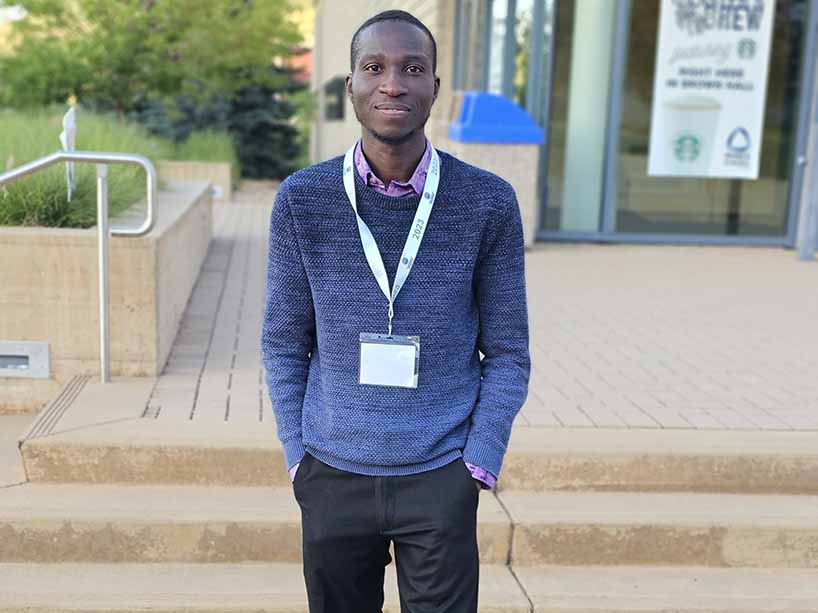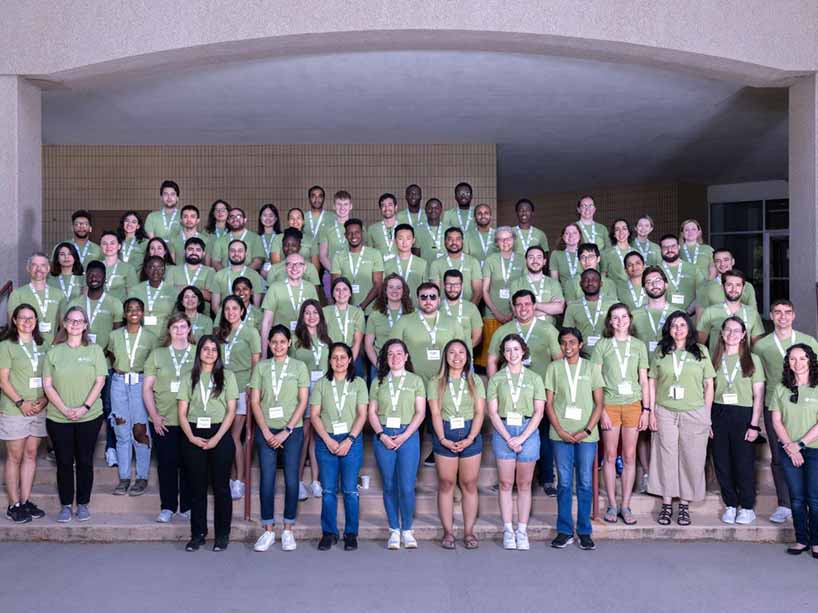PhD student snags coveted spot at American Chemical Society’s summer school
Emmanuel Fagbohun makes commitment to green chemistry and sustainable energy after attending prestigious summer session

Originally from Nigeria, Fagbohun completed his undergraduate degree in Nigeria before going to China to complete his master’s degree.
This summer, a TMU molecular science student spent a week at the American Chemical Society (ACS) green chemistry and sustainable energy summer school (external link) in Colorado.
Emmanuel Fagbohun was one of 60 North and South America including Caribbean students, out of 200 applicants, to get the chance to engage in sustainable chemistry lectures, discussions, poster presentations and networking events. The program covered topics ranging from toxicology, green nanoscience and biocatalysis.
We caught up with Fagbohun to find out more about his experience in the summer school and what he’s studying at TMU.
What did you learn at the summer school?
I learned a key lesson about overcoming a major obstacle to invention – converting traditional synthesis methods into a new and sustainable synthesis method. This means using eco-friendly materials and processes to create valuable products, such as selecting greener solvents based on a thorough analysis of their impact on the environment and human health. This analysis considers factors like global warming, pollution, toxicity and energy use.
What is your PhD about?
Photocatalysis, which is an emerging and innovative approach to make clean fuels sustainably and provide a renewable energy source that is economically friendly. Scientists are finding better materials and technology to make this process more practical. Using light, we can split water into a clean energy source by producing hydrogen gas, reducing our need for fossil fuels and minimizing environmental impact.
Tell me about your educational journey.
I did my bachelor’s degree in chemistry at the University of Ilorin in Nigeria, where I researched natural product synthesis which involves the determination of the chemical compositions, antioxidants and antimicrobial activities of novel plants.
I was lucky to get a prestigious scholarship to do my master’s degree at the University of Chinese Academy of Sciences in Beijing. I looked into the application of carbon materials in energy storage, hydrogen storage and wastewater treatment.
I’m happy to have started my journey at TMU last fall and I’m fortunate to be part of this great community. I am particularly impressed by the excellence of innovative and interdisciplinary research between chemistry and biology in the molecular science program, coupled with renowned faculty, state-of-the-art research facilities, a conducive learning environment, a unique development environment, and a well-balanced academic program.

Alumni of the week-long course have gone on to become leaders in the green chemistry field—providing a network of contacts for participants.
Why did you decide to pursue a PhD in molecular science?
I love learning and researching, plus I want to contribute to research on wastewater treatment, energy generation, and storage by fabricating novel materials that can be produced on a large scale for industrial applications.
What is your goal in the green chemistry field?
Attending the summer school shaped my goal for green research. Initially, I wanted to recycle waste and reduce greenhouse emissions by changing our energy sources to renewable energy. Now, I am adding to my goal grass root sensitization of green chemistry and avoiding waste generation in research rather than recycling waste.
What are your plans for the future?
I want to look for faculty positions to impact and transfer my knowledge to future generations and apply my research carried out in the laboratory to the industry. I intend to do research that always involves any of the 12 principles of green chemistry (external link) , which is the framework for making a greener chemical, process, or product.
Related stories:
Article previously published on September 12, 2023 at https://www.torontomu.ca/news-events/news/2023/09/phd-student-snags-coveted-spot-at-american-chemical-societys-summer-school/.